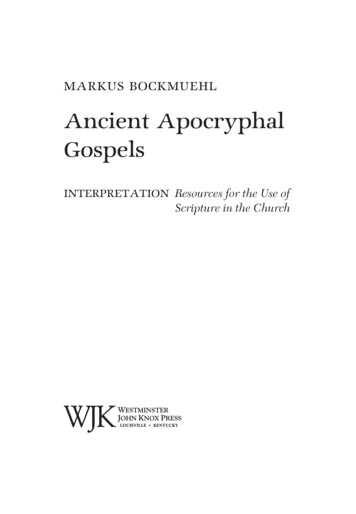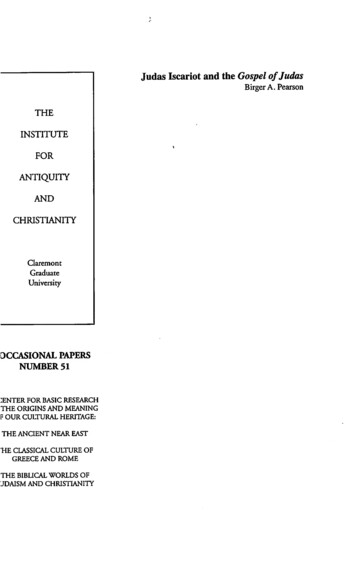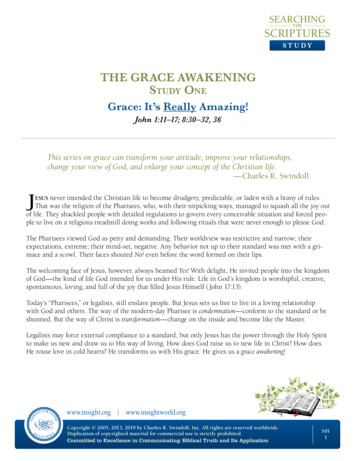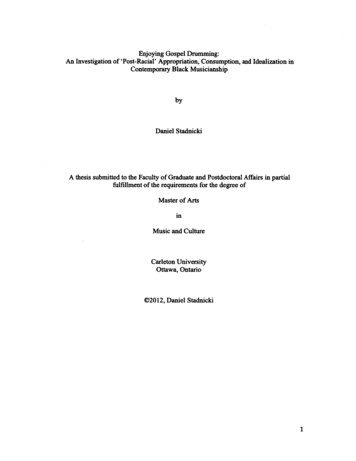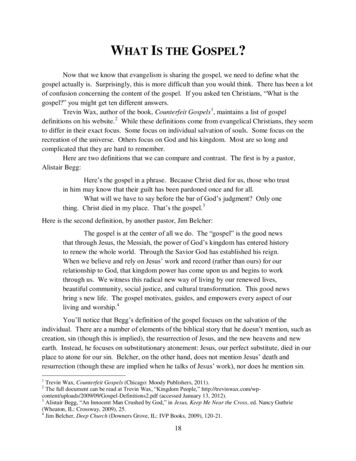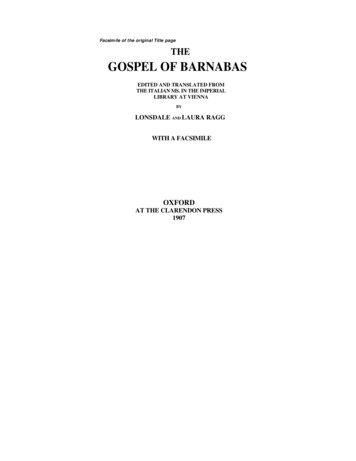
Transcription
THE GOSPELACCORDINGTO GRACEA Clear Commentary on theBook of Romansby Chuck SmithOriginal file posted August 4, 2001 at CalvaryChapel.com.Reformatted on April 13, 2012 by The Geeky Christian.For more free Chuck Smith books in this formatvisit http://geekychristian.com/free-christian-ebooks/
Table of Contents1. The Lost World2. God's Justice3. The Free Gift4. Abraham and Faith5. Just As If I Never Did It6. Victory Over Sin7. Flesh Vs. Spirit8. Set Free!9. Chosen10. Saved11. Natural and Spiritual Israel12. The Living Sacrifice13. Obedience and Love14. Judging Others15. Christian Unity16. BlessingsAppendix: Study Guide2 Page
1. The Lost WorldThe Book of Romans begins, Paul, a servant of JesusChrist (1:1a). The word "servant" in Greek is doulos,which means "bondslave." A bondslave had no rights ofhis own. He belonged totally to his master. As abondslave of Jesus Christ, Paul was living totally for hisMaster.Paul was called to be an apostle (1:1b). "Apostle"literally means "one who is sent." In his calling Paulwas separated unto the gospel of God (1:1c). Weremember that in the Book of Acts the Holy Spirit said,"Separate me Barnabas and Saul [Paul] for the workwhereunto I have called them. And when they hadfasted and prayed, and laid their hands on them, theysent them away" (Acts 13:2-3). Paul was sent by theHoly Spirit to bear the Gospel to the Gentiles. The word"gospel" means "good news." To hear some people tellit, God is bad news. But that's not true! God's love forus in Jesus Christ is good news.(Which he had promised afore by his prophets in theholy scriptures) (1:2). This Gospel wasn't an event thatsimply happened without warning. The message of theGospel, especially to the Gentiles, was spoken of byGod through the prophets. (When Paul refers to the"holy scriptures," he has only the Old Testament inmind.)3 Page
The good news is about God's Son, Jesus Christ ourLord (1:3a). So often we read the "Lord Jesus Christ"and think of this as His first, middle, and last name."Lord" is not His name; it is His title. The Greek wordfor "lord" is kurios."Jesus" is His name. This is a Greek translation of theHebrew name "Joshua," meaning "Jehovah is salvation."In Matthew's gospel we read, "The angel of the Lordappeared unto him in a dream, saying, Joseph, thou sonof David, fear not to take unto thee Mary thy wife: forthat which is conceived in her is of the Holy Ghost.And she shall bring forth a son, and thou shalt call hisname Jesus: for he shall save his people from their sins"(Matthew 1:20-21). His name implies His mission: "heshall save his people from their sins." "Christ" is Greekfor the Hebrew word meaning "messiah" or "theanointed one of God," the one whom God hadpromised to send to His people. "Christ" or "Messiah"signifies His ministry as the fulfillment of the promiseof God. "Jesus Christ our Lord" signifies the believer'srelationship to Him.In the Bible we read, "If thou shalt confess with thymouth the Lord Jesus, and shalt believe in thine heartthat God hath raised him from the dead, thou shalt besaved. For with the heart man believeth untorighteousness; and with the mouth confession is madeunto salvation" (Romans 10:9-10). The first part of thatpassage would be better translated, "If thou shaltconfess with thy mouth that Jesus Christ is Lord." Ourobligation is more than confessing belief in Jesus Christ.You can believe that Jesus Christ is the Son of God, but4 Page
not be saved. You can believe that He died on the crossfor your sins, yet not be born again. It's necessary tosubmit your life to Him as Lord of your life in order tohave salvation.Concerning his Son Jesus Christ our Lord, which wasmade of the seed of David according to the flesh (1:3).As king of Israel, David had a beautiful house inJerusalem. When he saw the tent where people wereworshipping God, he said, "Here I am dwelling in thisexquisite palace, and all we have is a tent for God. I'mgoing to build a beautiful house for Him."The prophet Nathan told him, "David, that sounds likea marvelous idea." But that night the Lord spoke toNathan and told him that he had spoken hastily. "Goback and tell David that he can't build My house. It'sgood that the desire is in his heart, but he has shed toomuch blood." To soften David's disappointment Godtold Nathan, "Tell David that I'm going to build him ahouse."So, the prophet told David, "I have some good newsand some bad news. The bad news is that you can'tbuild a house for God. The good news is that God isgoing to build you a house." God was telling David thatthrough him the Messiah would come. God wouldestablish His kingdom through David's seed, and therewould never lack one from his offspring to sit upon thethrone.David was overwhelmed. "Who am I, O Lord God, andwhat is mine house, that thou hast brought mehitherto?" (I Chronicles 17:1-16). The Lord took David5 Page
from following after sheep and made him ruler overHis people. Now He planned to build David a houseand establish his throne forever."Lord, what can I say?" David was speechless. Nowthat's a remarkable statement for David to make,because he was very gifted with words. Whenever Ifind it difficult to express my feelings to God, I turn tothe Psalms where David expresses such things so well.Yet, here David was speechless because of God'sgoodness and grace. It's a wonderful experience whenGod so blesses us that words become inadequate todescribe our feelings. As Savonarola said, "Whenprayer reaches its ultimate, words are impossible."As we trace the genealogy of Christ back through Maryin Luke's gospel, we find Him coming through the lineof David. Jesus is God incarnate and the seed of David,the beautiful God-Man, declared to be the Son of Godwith power, according to the spirit of holiness (1:4), forHe was conceived by the Holy Spirit.Some people say that the Virgin Birth is onlymentioned in two of the Gospels and so we don't needto accept the event as fact. If we don't accept the VirginBirth as fact, then who was Jesus' father? How manytimes does God have to tell us something before webelieve it? God has told us twice. Isn't that enough?Jesus is the seed of David according to the flesh; anddeclared to be the Son of God with power, according tothe spirit of holiness, by the resurrection from the dead(1:3b-4).6 Page
By whom we have received grace and apostleship, forobedience to the faith among all nations, for his name(1:5). Paul had the anointing and calling of an apostle,although he considered himself to be the chief ofsinners (I Timothy 1:12-15).Among whom are ye also the called of Jesus Christ.And now a salutation, To all that be in Rome, belovedof God, called to be saints: Grace to you and peace fromGod our Father, and the Lord Jesus Christ (1:6-7). Thefirst title given to the believers, "beloved of God," fitseveryone. Many times it's difficult for us to acceptGod's love, because we oftentimes don't really loveourselves. Since we don't love ourselves, we wonderhow can God love us. But He does!More than that, we're called "saints." It was tragic whenthe Church decided to honor certain people for specialdeeds, thus setting criteria for sainthood. Shouldmiracles occur by praying to a deceased person whowas known for doing outstanding works during hislifetime, then the Church chose to consider the person asaint. Don't worry if the Church overlooked you. Godhas chosen you, and it's better to be considered a saintby God than from the Church any day. You have beencalled a saint. Now live up to your calling.Grace to you and peace from God our Father, and theLord Jesus Christ (1:7b). Grace and peace are called theSiamese twins of the New Testament because they'realways coupled together. This is the proper order of thetwo words, for you can't have the peace of God untilyou've first experienced His grace.7 Page
Peace with God is necessary before you can have thepeace of God. They're two different experiences. Youcan experience peace with God when you're saved, butstill not know the peace of God.Many Christians are upset, worried, and frantic.They're not sure that God will work out everything,and their lives are in turmoil. They don't have the peaceof God. This is the peace to which Paul is referring.After I recognize that the grace of God is unmeritedfavor, I can experience the peace of God because I'm nolonger striving. I realize that His blessings haven't beenearned by my merit or goodness. I'm now trusting inGod's completed work, and I'm at peace in myrelationship with God. I've totally committed myself toHim.First, said Paul, I thank my God through Jesus Christfor you all (1:8a). In the New Testament we're taught topray to God through Jesus Christ. "Whatsoever ye shallask in my name," Jesus said, "that will I do, that theFather may be glorified in the Son. If you shall ask anything in my name, I will do it" (John 14:13-14).Your faith is spoken of throughout the whole world(1:8b). The godly faith of the Roman believers was wellknown throughout the Church world.For God is my witness, whom I serve with my spirit inthe gospel of his Son, that without ceasing I makemention of you always in my prayers (1:9). Paul'sprayers were in the closet, so to speak. Paul states, "Godis my witness," because he can't call on any man toverify his prayers. He was following the instructions8 Page
Jesus gave us when He said, "Enter into thy closet, andwhen thou hast shut thy door, pray to thy Father whichis in secret" (Matthew 6:6a).Making request, if by any means now at length I mighthave a prosperous journey by the will of God to comeunto you. For I long to see you, that I may impart untoyou some spiritual gift, to the end ye may beestablished (1:10-11). Paul's motive for going to Romewasn't to see the great Forum or the Circus Maximus,but to minister to the believers. He wanted to impartsome spiritual gift through which they might bestrengthened.That is, that I may be comforted together with you bythe mutual faith both of you and me (1:12). Gatheringtogether with God's people has a two-way effect. Youcannot minister to others without being ministered toyourself. That's the beauty of sharing our spiritual giftswith one another. Jesus said, "Give, and it shall begiven unto you" (Luke 6:38a). Sowing the truth in lovealways reaps the same.Now I would not have you ignorant, brethren, thatoftentimes I purposed to come unto you, (but was lethitherto) that I might have some fruit among you also,even as among other Gentiles (1:13). Paul wanted tovisit them before, but had been hindered. The apostlewasn't deliberately slighting the Romans by hisabsence.I am debtor both to the Greeks, and to the Barbarians;both to the wise, and to the unwise (1:14). "Barbarian" isan unfortunate word here because of its modern9 Page
meaning as "savage." The term originated because theGreeks considered that all foreign languages soundedlike "bar-bar" on incomprehensible babbling. Theexpression actually referred to those who didn't speakGreek. It wasn't a derogatory expression in Paul's day.So, as much as in me is, I am ready to preach the gospelto you that are at Rome also. For I am not ashamed ofthe gospel of Christ: for it is the power of God untosalvation to everyone that believeth; to the Jew first,and also to the Greek (1:15-16). Jesus Christ is God'spower of salvation. To whom? To everyone whobelieves.For therein is the righteousness of God revealed fromfaith to faith: as it is written, The just shall live by faith(1:17). Paul begins early in the book to introduce thetwo themes of his message: (1) the righteousness whichis of God through faith and (2) the just shall live byfaith. Man's righteousness before God isn't predicatedupon the Law of Moses or the works of man, but uponbelieving in the work of God.For the wrath of God is revealed from heaven againstall ungodliness and unrighteousness of men, who holdthe truth in unrighteousness (1:18). Verse 16emphasizes the power of God, verse 17 therighteousness of God, and verse 18 the wrath of God.People talk about the power and righteousness of God,but they often deny or ignore one aspect of God'snature - His wrath.The Mosaic Law was written on two tablets of stone.The first tablet dealt with man's relationship with God;10 P a g e
the second dealt with man's relationship with his fellowman. A man is ungodly when he isn't right with God;he is unrighteous when he isn't right with his fellowman as God wishes him to be.The wrath of God is to be revealed against theungodliness and unrighteousness of men. The twotablets of stone are thus tied together. You cannot havea right relationship with God and a wrong relationshipwith your brother. If you say that you love God, thenyou have to love your brother also. You cannot loveGod and hate your brother.Some people hold the truth of God, but they hold it inunrighteousness. You say you believe in God. That'swonderful. It's the place to start, but alone it isn'tenough. The devils believe in God, so what makes youdifferent from them? You must believe in God andglorify Him. That's the difference!Because that which may be known of God is manifestin them; for God hath shewed it unto them. For theinvisible things of him from the creation of the worldare clearly seen, being understood by the things that aremade, even his eternal power and Godhead; so thatthey are without excuse (1:19-20). The existence of Godis universally attested to. The design of His work is selfevident to all. Those who deny or ignore God aretotally without excuse.When they knew God, they glorified him not as God(1:21a). Paul's first indictment against natural men isthat they knew God, but they didn't glorify Him asGod.11 P a g e
How many times have I failed to honor God andinstead found myself arguing with Him. Peter and Paulargued with the Lord. This trait is part of my humanweakness, and it doesn't give glory to God. By arguingwith God, I bring Him down to my level, and evenreduce Him below my level, because my premise is thatI'm right. It's ridiculous! God knows far more about myown situation than I do.Neither were [they] thankful (1:21b). FirstThessalonians 5:18 says, "In everything give thanks: forthis is the will of God in Christ Jesus concerning you."The circumstances of your life have been ordained byGod and are working together according to a divineplan. "The steps of a good man are ordered by theLord" (Psalm 37:23a). Nothing happens to you byhappenstance or accident. Don't say, "Good luck!"There is no such thing for a Christian. Similarlywhenever you complain about your circumstancesyou're actually complaining about God. He has broughtcertain situations into your life for the best. When youmoan and groan, God is displeased with yourunthankful heart.As Christians we need to learn to accept the things thatcome across our paths. "We know that all things worktogether for good to them that love God" (Romans8:28a). May this truth be embedded in our hearts! Whenevents that seem like tremendous tragedies come, weoften ask, "If God loves me how could He allow this tohappen?" We can't understand everything that comesacross our paths, and God doesn't promise us total12 P a g e
understanding. The lyrics to an old southern song havebrought comfort to many.Further along we'll know all about it.Further along we'll understand why.Cheer up, my brother, live in the sunshine.We'll understand it all by and by.The point of the song is that in heaven we can sit downwith Jesus and ask, "Why did that have to happen?"However, when we get to heaven, we'll be so excitedand full of rejoicing that we'll just enjoy it all! Goddoesn't owe us any explanations, but we owe Him ourcomplete obedience, surrender, and submission.Imagine the potter with the clay. In front of him is thepotter's wheel used to shape the vessel. After gettingthe clay to the right consistency, he throws it on thecenter of the wheel and begins to form it. The clay leapsup at his touch as he shapes it.Now as clay in the hands of the potter, so am I in thehands of God. The wheel on which the potter molds theclay is like the circumstances of my life. The wheel isunder the total control of the potter, and that's all theclay needs to know. "It hurts!" the clay may complain. "Iwonder how much longer the potter will mold me.Won't he ever stop?"God molds me by ordaining the circumstances of mylife. I submit to Him so that He might work in me Hiseternal purposes. "I thank You, God, for all thedisappointments and losses that I have experienced."Paul says, "The sufferings of this present time are not13 P a g e
worthy to be compared with the glory which shall berevealed in us" (Romans 8:18). "For our light affliction,which is but for a moment, worketh for us a far moreexceeding and eternal weight of glory" (II Corinthians4:17).God's work in your life may be painful right now, butHe's aiming at the eternal goal. He wants to bring youinto a more glorious entrance into His kingdom. MaybeHe has to deprive you now of something that you feelis so very important, but He overlooks your temporaryease for your eternal interest. He has such wonderfulthings prepared, and He's trying to lead us towardthem. If only we would learn to flow with the Spiritand be thankful in all things, because we belong toGod. If we live this way we'll never be disappointed.Accepting God's will for your life is like the little boywho built a model ship. He carefully glued into placeall the masts, riggings, and sails. After months of laborhe took it down to the pond and gently laid it on thewater. Proudly, he watched as the wind filled the sailsand the little boat sailed gracefully across the pond.Midway across the lake a strong gust of wind knockedthe sailboat over and it sank. The little boy looked upand said, "Wow! What a great wind for flying a kite!"When God stops you on one venture, be open to whatHe may have in mind. Don't sit down and cry. He hassomething else for you to do. Look for it!God often has to deal with us severely, because we'renot open and listening to Him. We easily get into rutswith our well-ordered lives and stop looking for what14 P a g e
God wants us to have. "I'm at a good job, gettingseniority, and doing fine. This is terrific!" One day yougo to work and the foreman says, "Here's yourtermination notice."Now it's, "Lord! What are You doing to me? This isterrible!" God has a better job for you, but you weren'tlooking for it. Now you are! God couldn't bring you tothe better position until He upset the old conditions.Now you're open and listening to what God has to say.The Father delights in giving good things to Hischildren, just as a parent loves to give some wonderfulgift to his child.We have one son who's always been difficult to please.Buy him a new shirt and he'll say, "Does it match myslacks?" Buy him new shoes and he'll say, "Why didyou get that style?" Sometimes God has a hard timegiving us gifts, too. What a disappointment when yougive a truly wonderful gift to someone you love, and heor she barely acknowledges it. That isn't a responseanyone appreciates, especially God.But became vain in their imaginations, and their foolishheart was darkened. Professing themselves to be wise,they became fools (1:21b-22). Our imaginations oftenfocus on the empty things of the world, and much ofour mental power is exercised on vain fantasies. Howmuch better when our hearts and minds are filled withGod, His Word, and His love. The wisdom of the worldis foolishness to God. Many times we profess ourselvesto be wise and actually become fools by the theoriesthat we believe and follow.15 P a g e
And changed the glory of the incorruptible God into animage made like to corruptible man (1:23a). The men ofthe world tried to make an image of God by fashioningit in the form of man.And to birds, and four-footed beasts, and creepingthings (1:23b). Have you ever seen the grotesqueimages of past civilizations or the awful images in Indiatoday that are worshipped as God? Quite often thestatues are part man and part animal. How tragic andfoolish! Yet people worship these things and say,"That's God. "Now we come to the first "giving up" by God.Wherefore God also gave them up to uncleanness[sexual uncleanness or impurity] through the lusts oftheir own hearts, to dishonor their own bodies betweenthemselves (1:24). Whenever man fashions an image ofGod in the form of a man, he brings God even belowhis own level. When a man puts eyes and ears on anidol, it still can't see or hear. Setting God below his ownlevel creates moral depravity in man, for he loses hishigh ideals and becomes like his god. His god is lessthan man, thus his god becomes in his mind a basecreature.The ritual worship of false gods was often donethrough fertility rites and practices. In Paul's time, thegreat temple of Aphrodite stood on the Acropolis inCorinth. The priestesses of this temple were prostituteswho came into the city nightly. The Corinthians"worshipped" Aphrodite through sexual rites, and theprofit supported their religion. Man degrades himself16 P a g e
whenever he worships anything other than the true andliving God. So, man is given up by God and given overto "uncleanness."Who changed the truth of God into a lie (1:25a). Manhas to live with himself, so he rationalizes his evildeeds in order to ease his conscience. But to do that hehas to change God. He challenges God's Word andclaims, "The Bible isn't really the inspired Word ofGod." Or he underestimates Him. "God doesn't care. Heisn't really concerned."In Paul's day some men believed that the body wascompletely separate from God's concern. These mentaught that you must worship God in the realm of thespirit, but you could do whatever you pleased withyour body. Such a teaching changes the truth of Godinto a lie, just to accommodate the lusts of the flesh.And worshipped and served the creature more than theCreator (1:25b). Men are doing the same thing today asin Paul's day. They're worshipping and serving theworks of their own hands rather than the Creator of allthings. Idolatry, one of the most common of all sins, isthe obsession for the things made by men's hands. Theidolater cannot rest until he possesses the object of hisdesire. For this cause God gave them up (1:26a).Paul also tells us that God gave them up unto vileaffections: for even their women did change the naturaluse into that which is against nature: and likewise alsothe men, leaving the natural use of the woman, burnedin their lust one toward another (1:26-27). Lesbianismand homosexuality follow whenever God gives up17 P a g e
women and men to the things they desire. Don't tell methat God created a homosexual that way. That'schanging the truth of God into a lie. Man becomesperverted because he doesn't want to retain God in hismind. He refuses to glorify God as God, and he seeks tomake a god after himself. God gives him up to thesevile affections, because he has rejected the truth of Godwithin his own heart.But if a person will return and submit himself to thetruth, Jesus will free him from that power and mannerof life. He came to set the captive free!Even as they did not like to retain God in theirknowledge, God gave them over to a reprobate mind,to do those things which are not convenient [ought notto be done]; being filled with all unrighteousness,fornication, wickedness, covetousness, maliciousness;full of envy, murder, debate, deceit, malignity;whisperers, backbiters, haters of God, despiteful,proud, boasters, inventors of evil things, disobedient toparents, without understanding, convenant breakers,without natural affection, implacable, unmerciful (1:2831).This passage shows the sad picture of society today.People have sought to rule God out of theirconsciences. So, God has given them up to these vilepractices. These sins will manifest themselveswhenever a society turns its back upon God and seeksindependence from Him. Whoever rejects Jesus Christwill find himself going downhill fast, doing things he18 P a g e
never dreamed of, and losing any scruples againstdoing them.Who knowing the judgment of God, that they whichcommit such things are worthy of death, not only dothe same, but have pleasure in them that do them(1:32). Many people hold a prideful view of themselves,as the Pharisee who said, "God, I thank thee, that I amnot as other men" (Luke 18:11). They feel smug becausethey're innocent of some of the grosser forms of sin.Yet, they go to a movie or watch a TV program asactors portray these vile things, and they actually enjoyor "have pleasure in them that do them." We need totake great care not to sow to our flesh in any way. "Forhe that soweth to his flesh shall of the flesh reapcorruption" (Galatians 6:8).19 P a g e
2. God's JusticeThere is no break in Paul's writing between Chapters 1and 2, and he continues in the next verse, Thereforethou art inexcusable, O man, whosoever thou art thatjudgest: for wherein thou judgest another, thoucondemnest thyself; for thou that judgest doest thesame things (2:1). We may judge someone else's sins,but so often we're guilty of the very same act.Watching television and movies can be dangerous.Often a person receives vicarious pleasure fromwatching the violence and corruption on the screen. Hewouldn't think of doing such things himself, but whenhe sees them portrayed on a screen he drinks it all in.He's as guilty as the people he's watching, because he'smentally indulging in the same practices.But we are sure that the judgment of God is accordingto truth against them which commit such things (2:2).God's judgment will be according to truth, becauseHe'll judge not only men's actions but the motives thatprompted the actions.Many times after committing a crime, a man will makeup an excuse to justify what he's done. As he gives youhis explanation, he sounds like he really is innocent.However, he made up the story after the fact to justifyhimself and avoid punishment.20 P a g e
God told Ezekiel, "Dig a hole through the wall, go in,and take a look around the house of Israel." Ezekielwent in and saw many filthy pictures, detestableanimals, and idols upon the walls. The Lord said,"You're seeing the insides of the minds of men" (Ezekiel8:8-12).Some day you may stand before God in heaven saying,"I didn't intend to cause any harm." He could say, "Let'sreview the thoughts that were in your mind at thatmoment." The Bible says, "All things are naked andopened unto the eyes of him with whom we have todo" (Hebrews 4:13b). You can't hide from God. Heknows the secret motives of your heart, and Hisjudgment will be according to the absolute truth.Or despisest thou the riches of his goodness andforbearance and long-suffering; not knowing that thegoodness of God leadeth thee to repentance? (2:4). Menso often mistake the patience of God as a weakness or,worse yet, as approval. A man says, "If there is a God inheaven, let Him strike me dead!" He shakes his fist atGod. When he isn't struck dead, he says, "I told you.There is no God." How foolish! A person may be lulledinto believing that God doesn't care or that He evenapproves of his sins, because God's judgment isn'timmediate. By misinterpreting the patience of God as"getting by with it," a man shows despite toward thegoodness of God and fools himself.The goodness of God leads a man to repentance. Somany times a preacher tries to get a sinner to repent byshaking him over hell and emphasizing the wrath of21 P a g e
God. In reality, knowing how much he deserves thejudgment and wrath of God, yet realizing the goodness,forbearance, and long-suffering of God, causes a man torepent.The day of judgment will come and all secrets will berevealed. But after thy hardness and impenitent hearttreasurest up unto thyself wrath against the day ofwrath and revelation of the righteous judgment of God(2:5). That's why I pray, "Remember not the sins of myyouth" (Psalm 25:7a). That's why David prayed, "Havemercy upon me, O God. according unto the multitudeof thy tender mercies blot out my transgressions"(Psalm 51:1). As a sinner David didn't say, "Have justiceon me, O God."God will render to every man according to his deeds(2:6). By continuing to sin, a person is damming up ahuge reservoir of judgment that will finally burst andcarry him off in the torrent. To them who by patientcontinuance in well doing seek for glory and honourand immortality, God will reward with eternal life. Butunto them that are contentious, and do not obey thetruth, but obey unrighteousness, indignation andwrath, tribulation and anguish, upon every soul of manthat doeth evil, of the Jew first, and also of the Gentile;but glory, honour, and peace, to every man thatworketh good, to the Jew first, and also to the Gentile(2:7-10).For there is no respect of persons with God (2:11). Inthis particular dispensation God deals equally with allmen, Jews and Gentiles. If you're following Christ, He'll22 P a g e
bless and reward you. If you harden your heart againstHim by following your own path, then God will judgeyou regardless of whether you're a Jew or a Gentile.Your nationality won't make the day of judgment anyeasier for you, because God doesn't show anyfavoritism.For as many as have sinned without law shall alsoperish without law: and as many as have sinned in thelaw shall be judged by the law (2:12). Those who havenever heard about Jesus Christ will be judgedaccording to the knowledge that they have had. If theydidn't have the Law of Moses, they'll be judged apartfrom the Law.(For not the hearers of the law are just before God, butthe doers of the law shall be justified. For when theGentiles, which have not the law, do by nature thethings contained in the law, these, having not the law,are a law unto themselves: which show the work of thelaw written in their hearts, their conscience also bearingwitness, and their thoughts the meanwhile accusing orelse excusing one another) (2:13-15).God has given each person a basi
Grace to you and peace from God our Father, and the Lord Jesus Christ (1:7b). Grace and peace are called the Siamese twins of the New Testament because they're always coupled together. This is the proper order of the two words, for you can't have the peace of God u

